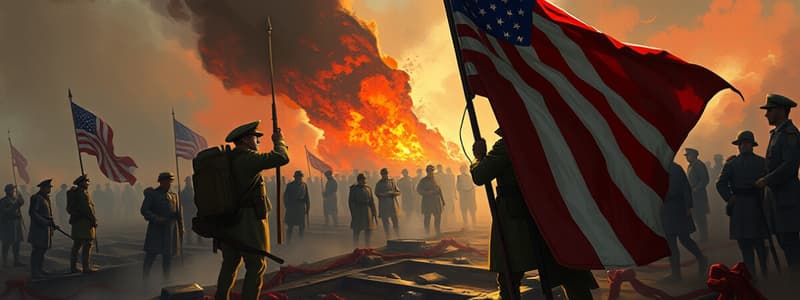Podcast
Questions and Answers
What event significantly raised American outrage and contributed to the U.S. shifting towards involvement in the war?
What event significantly raised American outrage and contributed to the U.S. shifting towards involvement in the war?
- The sinking of the Lusitania (correct)
- The release of the Zimmermann Note
- The formation of the League of Nations
- The signing of the Treaty of Versailles
Which of the following best describes the U.S. position prior to declaring war in 1917?
Which of the following best describes the U.S. position prior to declaring war in 1917?
- Desiring to remain neutral despite sympathies towards Britain (correct)
- Indifferent to the conflict and its implications
- Eagerly leaning towards alliance with Germany
- Wanting a quick resolution through peace treaties
What was the primary instigator that prompted the U.S. to finally declare war in April 1917?
What was the primary instigator that prompted the U.S. to finally declare war in April 1917?
- Involvement of foreign troops on American soil
- Unrestricted submarine warfare by Germany
- The assassination of Archduke Ferdinand
- Germany's proposal for an alliance with Mexico (correct)
What phrase became a rallying cry reflecting American outrage over British shipping incidents?
What phrase became a rallying cry reflecting American outrage over British shipping incidents?
Which country did the U.S. express more sympathy towards before entering the war?
Which country did the U.S. express more sympathy towards before entering the war?
Flashcards are hidden until you start studying
Study Notes
U.S. Neutrality in World War I
- The United States initially sought to maintain neutrality during World War I due to various factors, including economic interests and political considerations.
- American public sentiment leaned towards the Allies, particularly aligning sympathies with Britain, due to cultural and historical ties.
Key Events Leading to U.S. Involvement
- The sinking of British ships, notably the Lusitania, provoked significant American outrage; this incident escalated calls for war with the rallying cry "Remember the Lusitania."
- The Zimmermann Note was a pivotal moment; Germany's proposal to Mexico, encouraging it to attack the U.S. in exchange for support to reclaim lost territories, outraged Americans and shifted public opinion decisively.
U.S. Declaration of War
- Amid rising tensions, the U.S. officially declared war on Germany in April 1917, marking a significant shift from isolationism to active involvement in international conflict.
Studying That Suits You
Use AI to generate personalized quizzes and flashcards to suit your learning preferences.




